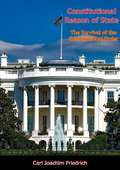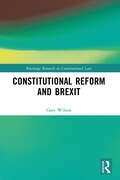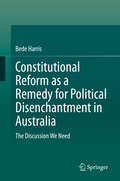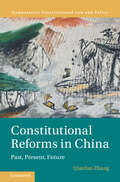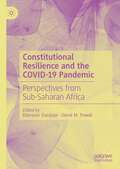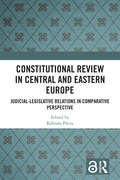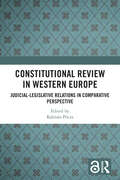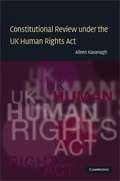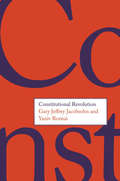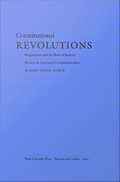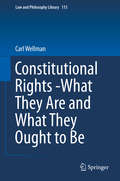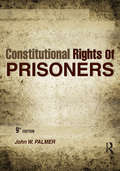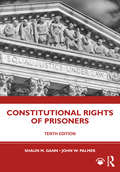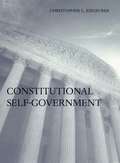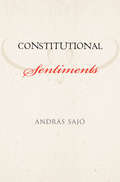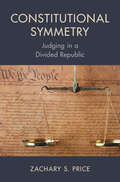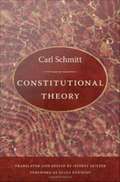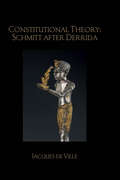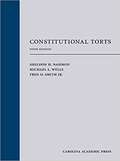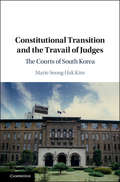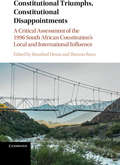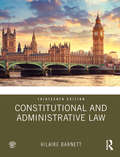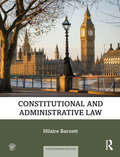- Table View
- List View
Constitutional Reason of State: The Survival of the Constitutional Order
by Carl Joachim FriedrichTHE PRESENT STUDY proposes to explore the history of the problem of ‘reason of state’ in a constitutional political order. The writers treated belong among the ‘great’ in modern political thought and therefore it is not and cannot be a question of dealing with the integral thought of the writers here examined. All we can hope to do is to seek out those aspects which bear more immediately upon this particular problem. Ratio status,—the very term shows that we are moving within the context of the great tradition of Western rationalism, where everything has its particular ratio or inner rationale which it behoves the mind to grasp and to understand. For the idea of such rationes is prominent in the Middle Ages,—an aspect of the matter which receives scant attention in Friedrich Meinecke’s magistral treatment of the subject Die Idee der Staatsräson in der Neueren Geschichte published in 1925 and by now become something of a classic. Perhaps partly because of his lack of sympathy for this rational basis of the idea which he was discussing, he also paid scant attention to that aspect of it which we are particularly concerned with here: reason of state in its application to the government of law, the constitutional order, in short ‘constitutional reason of state’ or more precisely ‘reason of the constitutional state.’
Constitutional Reform and Brexit (Routledge Research in Constitutional Law)
by Gary WilsonThis book examines the extent to which Brexit has impacted upon the operation of the British Constitution, prompting in turn consideration of how some of the factors which contributed to the outcome of the 2016 referendum, as well as the event of Brexit itself, might inform debates surrounding constitutional reform moving forward. The work seeks to make sense of the constitutional implications of Brexit and to revisit some of the key debates that have taken place in respect of particular constitutional reform proposals in order to assess the extent to which recent Brexit-related developments inform the perspectives which are taken upon their merits and prospects. The book is divided into two parts. The first provides some context for the substantive treatment of the potential impact of Brexit on constitutional reform debates which forms the focus of Part II. Part II centres on various specific constitutional reform themes or issues, which are explored further within the context of Brexit. For each such issue, the main parameters of the debates which have taken place are sketched out before moving on to consider how it has informed, or may come to be informed, by the phenomenon of Brexit. By so doing, it looks to some future directions for constitutional reform which take account of the factors driving the discourses which gave rise to the referendum outcome and subsequent developments, as well as offering meaningful responses to these. The book will be of interest to academics, researchers and policy-makers working in the areas of constitutional law, constitutional politics, philosophy and history.
Constitutional Reform as a Remedy for Political Disenchantment in Australia: The Discussion We Need
by Bede HarrisThe central argument of this book explores the disillusionment that Australians feel with regard to the way politics is conducted. The book explores causes of that disillusionment, and argues that because these are ultimately traceable to defects in the constitution, it is only through constitutional reform that government can be improved. This book argues that the current approach to constitutional debate suffers from the flaw of being anti-theoretical, in the sense that it is not grounded in any set of values, and is afflicted by a tendency to consider practical objections to reform before considering the moral case for it. This book argues that instead of accepting the constitution as it is, it is time we began to discuss how it ought to be, taking human dignity as the fundamental value upon which a constitution should be based. It then puts the case for change in a number of areas, including reform of the electoral system, enhanced parliamentary scrutiny of the executive, the inclusion in the constitution of a full bill of rights, the abolition of the federal system, realisation of the rights of Indigenous people, codification of constitutional conventions either in conjunction with or separately from an Australian republic, reform of the rules of standing in constitutional matters and, finally, the need to improve civics education. This book is designed to be provocative in the way that it directly challenges current academic orthodoxy. This book also outlines a proposed draft new constitution. This book will be of interest to anyone who is concerned about how Australia is governed and why it has been so difficult to achieve constitutional reform.
Constitutional Reforms in China: Past, Present, Future (Comparative Constitutional Law and Policy)
by Qianfan ZhangThis book offers the reformist perspective of one of the most persistent and outspoken constitutional reformers in China. Through the analysis of landmark constitutional events in China since the late nineteenth century, it reveals the fatal dilemma faced by constitutional reform and the deadly dangers of any violent revolution that arises out of the frustration with the repeated failures of reform. Although there is no easy way out of such a predicament, the book analyzes available resources in the existing system and suggests possible strategies that might bring success to future constitutional reforms.
Constitutional Resilience and the COVID-19 Pandemic: Perspectives from Sub-Saharan Africa
by Ebenezer Durojaye Derek M. PowellThis book explores the resilience of constitutional government in the wake of the COVID-19 pandemic, connecting and comparing perspectives from ten countries in sub-Saharan Africa to global trends.In emergency situations, such as the COVID-19 pandemic, a state has the right and duty under both international law and domestic constitutional law to take appropriate steps to protect the health and security of its population. Emergency regimes may allow for the suspension or limitation of normal constitutional government and even human rights. Those measures are not a license for authoritarian rule, but they must conform to legal standards of necessity, reasonableness, and proportionality that limit state action in ways appropriate to the maintenance of the rule of law in the context of a public health emergency. Bringing together established and emerging African scholars from ten countries, this book looks at the impact government emergency responses to the pandemic have on the functions of the executive, the legislature, and the judiciary, as well as the protection of human rights. It also considers whether and to what extent government emergency responses were consistent with international human rights law, in particular with the standards of legality, necessity, proportionality, and non-discrimination in the Siracusa Principles.
Constitutional Review in Central and Eastern Europe: Judicial-Legislative Relations in Comparative Perspective
by Kálmán PóczaRecent confrontations between constitutional courts and parliamentary majorities in several European countries have attracted international interest in the relationship between the judiciary and the legislature. Some political actors have argued that courts have assumed too much power and politics has been extremely judicialized. This volume accurately and systematically examines the extent to which this aggregation of power may have constrained the dominant political actors’ room for manoeuvre. To explore the diversity and measure the strength of judicial decisions, the contributors to this work have elaborated a methodology to give a more nuanced picture of the practice of constitutional adjudication in Central and Eastern Europe between 1990 and 2020. The work opens with an assessment of the existing literature on empirical analysis of judicial decisions with a special focus on the Central and Eastern European region, and a short summary of the methodology of the project. This is followed by ten country studies and a concluding chapter providing a comprehensive comparative analysis of the results. A further nine countries are explored in the counterpart volume to this book: Constitutional Review in Western Europe: Judicial-Legislative Relations in Comparative Perspective. The collection will be an invaluable resource for those working in the areas of empirical legal research and comparative constitutional law, as well as political scientists interested in judicial politics.
Constitutional Review in Central and Eastern Europe: Judicial-Legislative Relations in Comparative Perspective
by Kálmán PóczaRecent confrontations between constitutional courts and parliamentary majorities in several European countries have attracted international interest in the relationship between the judiciary and the legislature.Some political actors have argued that courts have assumed too much power and politics has been extremely judicialized. This volume accurately and systematically examines the extent to which this aggregation of power may have constrained the dominant political actors’ room for manoeuvre. To explore the diversity and measure the strength of judicial decisions, the contributors to this work have elaborated a methodology to give a more nuanced picture of the practice of constitutional adjudication in Central and Eastern Europe between 1990 and 2020. The work opens with an assessment of the existing literature on empirical analysis of judicial decisions with a special focus on the Central and Eastern European region, and a short summary of the methodology of the project. This is followed by ten country studies and a concluding chapter providing a comprehensive comparative analysis of the results. A further nine countries are explored in the counterpart volume to this book: Constitutional Review in Western Europe: Judicial-Legislative Relations in Comparative Perspective.The collection will be an invaluable resource for those working in the areas of empirical legal research and comparative constitutional law, as well as political scientists interested in judicial politics.Chapters 1, 5 and 12 of this book are freely available as a downloadable Open Access PDF at http://www.taylorfrancis.com under a Creative Commons Attribution-Non Commercial-No Derivatives (CC BY-NC-ND) 4.0 license.
Constitutional Review in Western Europe: Judicial-Legislative Relations in Comparative Perspective
by Kálmán PóczaRecent confrontations between constitutional courts and parliamentary majorities in several European countries have attracted international interest in the relationship between the judiciary and the legislature.Some political actors have argued that courts have assumed too much power and politics has been extremely judicialized. Yet the extent to which this aggregation of power may have constrained the dominant political actors’ room for manoeuvre has never been examined accurately and systematically. This volume fills this gap in the literature. To explore the diversity and measure the strength of judicial decisions, the authors have elaborated a new methodology that is intended to give a more nuanced picture of the practice of constitutional adjudication in Europe. The work opens with an assessment of the existing literature on empirical analysis of judicial decisions with a special focus on Western Europe and a short summary of the methodology of the project. This is followed by 11 country studies and a concluding chapter providing a comprehensive comparative analysis of the results. A further ten countries are explored in the counterpart volume to this book: Constitutional Review in Central and Eastern Europe: Judicial-Legislative Relations in Comparative Perspective.The collection will be an invaluable resource for those working in the areas of empirical legal research and comparative constitutional law, as well as political scientists interested in judicial politics.
Constitutional Review under the Uk Human Rights Act
by Aileen KavanaghUnder the Human Rights Act, British courts are for the first time empowered to review primary legislation for compliance with a codified set of fundamental rights. In this book, Aileen Kavanagh argues that the HRA gives judges strong powers of constitutional review, similar to those exercised by the courts under an entrenched Bill of Rights. The aim of the book is to subject the leading case-law under the HRA to critical scrutiny, whilst remaining sensitive to the deeper constitutional, political and theoretical questions which underpin it. Such questions include the idea of judicial deference, the constitutional status of the HRA, the principle of parliamentary sovereignty and the constitutional division of labour between Parliament and the courts. The book closes with a sustained defence of the legitimacy of constitutional review in a democracy, thus providing a powerful rejoinder to those who are sceptical about judicial power under the HRA.
Constitutional Revolution
by Gary Jeffrey Jacobsohn Yaniv RoznaiFew terms in political theory are as overused, and yet as under-theorized, as constitutional revolution. In this book, Gary Jacobsohn and Yaniv Roznai argue that the most widely accepted accounts of constitutional transformation, such as those found in the work of Hans Kelsen, Hannah Arendt, and Bruce Ackerman, fail adequately to explain radical change. For example, a “constitutional moment” may or may not accompany the onset of a constitutional revolution. The consolidation of revolutionary aspirations may take place over an extended period. The “moment” may have been under way for decades—or there may be no such moment at all. On the other hand, seemingly radical breaks in a constitutional regime actually may bring very little change in constitutional practice and identity. Constructing a clarifying lens for comprehending the many ways in which constitutional revolutions occur, the authors seek to capture the essence of what happens when constitutional paradigms change.
Constitutional Revolutions: Pragmatism and the Role of Judicial Review in American Constitutionalism
by Robert Justin LipkinIn Constitutional Revolutions Robert Justin Lipkin radically rethinks modern constitutional jurisprudence, challenging the traditional view of constitutional change as solely an extension or transformation of prior law. He instead argues for the idea of "constitutional revolutions"--landmark decisions that are revolutionary because they are not generated from legal precedent and because they occur when the Constitution fails to provide effective procedures for accommodating a needed change. According to Lipkin, U. S. constitutional law is driven by these revolutionary judgments that translate political and cultural attitudes into formal judicial decisions. Drawing on ethical theory, philosophy of science, and constitutional theory, Lipkin provides a progressive, postmodern, and pragmatic theory of constitutional law that justifies the critical role played by the judiciary in American democracy. Judicial review, he claims, operates as a mechanism to allow "second thought," or principled reflection, on the values of the wider culture. Without this revolutionary function, American democracy would be left without an effective institutional means to formulate the community's considered judgments about good government and individual rights. Although judicial review is not the only forum for protecting this dimension of constitutional democracy, Lipkin maintains that we would be wise not to abandon judicial review unless a viable alternative emerges. Judges, lawyers, law professors, and constitutional scholars will find this book a valuable resource.
Constitutional Rights -What They Are and What They Ought to Be (Law and Philosophy Library #115)
by Carl WellmanThis work explains the nature of constitutional rights. It does so by means of an analysis of the nature of law in general, the nature of constitutions, and the nature of rights. It looks in detail at several aspects of constitutional law, rights and institutions, as well as aspects related to public officials, private persons and associations. In addition, the book critically examines a considerable number of debates about whether some actual or proposed constitutional rights ought to be established and maintained in the United States constitution. It then identifies the kinds of reasons that justify or fail to justify constitutional rights. The book advances the debate and makes a contribution to the theory and the practice of constitutional rights.
Constitutional Rights of Prisoners
by John W. PalmerThis text details critical information on all aspects of prison litigation, including information on trial and appeal, conditions of isolated confinement, access to the courts, parole, right to medical aid and liabilities of prison officials. Highlighted topics include application of the Americans with Disabilities Act to prisons, protection given to HIV-positive inmates, and actions of the Supreme Court and Congress to stem the flow of prison litigation. Part II contains Judicial Decisions Relating to Part I.
Constitutional Rights of Prisoners
by John W. Palmer Shaun M. GannThis updated tenth edition covers all aspects of prisoners’ rights, including an overview of the judicial system and constitutional law and explanation of specific constitutional issues regarding correctional populations. It also discusses the federal statutes that affect correctional administration and inmates’ rights to bring litigation. Accessible and reader-friendly, it provides a practical understanding of how constitutional law affects the day-to-day issues of prisons, jails, and community corrections programs. The tenth edition includes a thorough update of relevant case law, and new chapters are included that deliver the latest developments on Search, Seizure, and Privacy, Juveniles and Youthful Offenders, and the Death Penalty. Part II contains the Supreme Court syllabi for the significant Court cases relating to the concepts covered. This updated edition is appropriate as a primary text for undergraduate or graduate-level correctional law and prisoner rights courses within Criminal Justice, Criminology, and Sociology departments. It is also an invaluable reference tool for law students and correctional agencies.
Constitutional Self-government
by Christopher L. EisgruberMost of us regard the Constitution as the foundation of American democracy. How, then, are we to understand the restrictions that it imposes on legislatures and voters? Why, for example, does the Constitution allow unelected judges to exercise so much power? And why is this centuries-old document so difficult to amend? In short, how can we call ourselves a democracy when we are bound by an entrenched, and sometimes counter-majoritarian, constitution? In Constitutional Self-Government, Christopher Eisgruber focuses directly on the Constitution's seemingly undemocratic features. Whereas other scholars have tried to reconcile these features with majority rule, or simply acknowledged them as necessary limits on democracy, Eisgruber argues that constitutionalism is best regarded not as a constraint upon self-government, but as a crucial ingredient in a complex, non-majoritarian form of democracy. In an original and provocative argument, he contends that legislatures and elections provide only an incomplete representation of the people, and he claims that the Supreme Court should be regarded as another of the institutions able to speak for Americans about justice. At a pivotal moment of worldwide interest in judicial review and renewed national controversy over the Supreme Court's role in politics, Constitutional Self-Government ingeniously locates the Constitution's value in its capacity to sustain an array of institutions that render self-government meaningful for a large and diverse people.
Constitutional Sentiments
by András SajóThe Constitution was written to shape human behavior and affairs, and it does so by appealing to people’s hearts, not only their minds. An interdisciplinary analysis sheds new light on the emotions that underlie constitutional law, with many cogent examples.
Constitutional Symmetry: Judging in a Divided Republic
by Zachary S. PriceIntense political disagreements over constitutional law and the Supreme Court have divided America. Constitutional Symmetry offers a fresh perspective by urging judges to make decisions that work 'symmetrically' across major partisan and ideological divides instead of favoring one partisan coalition over the other. Zachary S. Price argues this approach will aid the political process, align with the role morality of judging, and advance the framers' hopes for the Constitution. Chapters explore how this approach can encourage new solutions to fraught debates over free speech, religious liberty, separation of powers, federalism, affirmative action, gun rights, abortion, parental rights, and the law of democracy. Timely and innovative, this book is must-read for anyone seeking to understand the sources and implications of constitutional polarization in the contemporary United States.
Constitutional Theocracy
by Ran HirschlAt the intersection of two sweeping global trends—the rise of popular support for principles of theocratic governance and the spread of constitutionalism and judicial review—a new legal order has emerged: constitutional theocracy. It enshrines religion and its interlocutors as “a” or “the” source of legislation, and at the same time adheres to core ideals and practices of modern constitutionalism. A unique hybrid of apparently conflicting worldviews, values, and interests, constitutional theocracies thus offer an ideal setting—a “living laboratory” as it were—for studying constitutional law as a form of politics by other means. In this book, Ran Hirschl undertakes a rigorous comparative analysis of religion-and-state jurisprudence from dozens of countries worldwide to explore the evolving role of constitutional law and courts in a non-secularist world. Counterintuitively, Hirschl argues that the constitutional enshrinement of religion is a rational, prudent strategy that allows opponents of theocratic governance to talk the religious talk without walking most of what they regard as theocracy’s unappealing, costly walk. Many of the jurisdictional, enforcement, and cooptation advantages that gave religious legal regimes an edge in the pre-modern era, are now aiding the modern state and its laws in its effort to contain religion. The “constitutional” in a constitutional theocracy thus fulfills the same restricting function it carries out in a constitutional democracy: it brings theocratic governance under check and assigns to constitutional law and courts the task of a bulwark against the threat of radical religion.
Constitutional Theory
by Carl SchmittCarl Schmitt's magnum opus, Constitutional Theory, was originally published in 1928 and has been in print in German ever since. This volume makes Schmitt's masterpiece of comparative constitutionalism available to English-language readers for the first time. Schmitt is considered by many to be one of the most original--and, because of his collaboration with the Nazi party, controversial--political thinkers of the twentieth century. In Constitutional Theory, Schmitt provides a highly distinctive and provocative interpretation of the Weimar Constitution. At the center of this interpretation lies his famous argument that the legitimacy of a constitution depends on a sovereign decision of the people. In addition to being subject to long-standing debate among legal and political theorists in Western Europe and the United States, this theory of constitution-making as decision has profoundly influenced constitutional theorists and designers in Asia, Latin America, and Eastern Europe. Constitutional Theory is a significant departure from Schmitt's more polemical Weimar-era works not just in terms of its moderate tone. Through a comparative history of constitutional government in Europe and the United States, Schmitt develops an understanding of liberal constitutionalism that makes room for a strong, independent state. This edition includes an introduction by Jeffrey Seitzer and Christopher Thornhill outlining the cultural, intellectual, and political contexts in which Schmitt wrote Constitutional Theory; they point out what is distinctive about the work, examine its reception in the postwar era, and consider its larger theoretical ramifications. This volume also contains extensive editorial notes and a translation of the Weimar Constitution.
Constitutional Theory: Schmitt After Derrida (Birkbeck Law Press)
by Jacques de VilleThis book advances a new reading of the central works of Carl Schmitt and, in so doing, rethinks the primary concepts of constitutional theory. In this book, Jacques de Ville engages in a close analysis of a number of Schmitt’s texts, including Dictatorship (1921), The Concept of the Political (1927), Constitutional Theory (1928), Land and Sea (1942), Ex Captivitate Salus (1950), The Nomos of the Earth (1950) and The Theory of the Partisan (1963). This engagement takes place from the perspective of constitutional theory and focuses specifically on concepts or themes such as sovereignty, the state, the political, constituent power, democracy, representation, the constitution and human rights. The book seeks to rethink the structure of these concepts in line with Derrida’s analysis of Schmitt’s texts on the concept of the political in Politics of Friendship (1993). This happens by way of an analysis of Derrida’s engagement with Freud and other psychoanalysts. Although the main focus in the book is on Schmitt’s texts, it further examines two texts of Derrida (Khōra (1993) and Fors: The Anglish Words of Nicholas Abraham and Maria Torok (1976)), by reading these alongside Schmitt’s own reflections on the positive concept of the constitution.
Constitutional Torts
by Fred Smith Sheldon H. Nahmod Michael L. WellsThis casebook emphasizes important circuit court decisions together with relevant Supreme Court case law. This enables students to see how principles articulated in Supreme Court decisions are implemented by lower courts. Constitutional Torts also addresses affirmative duties, constitutional tort actions in state courts, and attorney's fees. Further, this book is organized around the statutory language of section 1983, thereby driving home the crucial distinction between prima facie cases and constitutional tort immunities and defenses. The fifth edition covers Supreme Court decisions from the past several years, including Ziglar v. Abbasi (2017) and Hernandez v. Mesa (2020) (chapter 1), Manhattan Community Access Corp. v. Halleck (2019) (chapter 2), Kingsley v. Hendrickson (2015), Knick v. Township of Scott (2019), and Manuel v. City of Joliet (2017) (chapter 3), Armstrong v. Exceptional Child Center (2015) (chapter 4), Nieves v. Bartlett (2019), Lozman v. Riviera Beach (2018), and Los Angeles v. Mendez (2017) (chapter 6), Ziglar, supra, White v. Pauly (2017), Hernandez v. Mesa (2017), District of Columbia v. Wesby (2018), Kisela v. Hughes (2018), and City of Escondido v. Emmons (2019) (chapter 8), McDonough v. Smith (2019) and Knick, supra (chapter 10), Goodyear Tire and Rubber Co. v. Haeger (2017) (chapter 12). As always, the circuit courts have been active as well, and we have revised the notes to take account of significant recent developments. Constitutional Torts studies circuit and district court decisions as crucial to understanding the developing law of Section 1983, because (a) they show how general principles of law pronounced by the Supreme Court are actually applied; (b) the Supreme Court rarely visits some important aspects of the doctrine; and (c) in this dynamic area of the law, the lower courts are the first to identify new issues and new ways of approaching old problems. At the same time, the materials continue to emphasize the "tort" aspects of Section 1983 litigation, especially with regard to affirmative duties, causation, official immunity, and damages. These materials illuminate both the similarities and differences between constitutional torts and analogous principles developed in the common law tort setting. By studying both tort and constitutional principles, students learn how to argue for and against the application of common law tort principles to constitutional tort issues, and will come to understand both the theoretical and practical consequences of the constitutional underpinnings of the litigation. Constitutional Torts provides a thorough treatment of compensatory damages, punitive damages, injunctive relief, and attorneys' fees. These materials not only explain the basic doctrine, but explore their strategic implications on the conduct of litigation.
Constitutional Transition and the Travail of Judges: The Courts of South Korea
by Marie Seong-Hak KimThis book looks at the history of the courts in South Korea from 1945 to the contemporary period. It sets forth the evolution of the judicial process and jurisprudence in the context of the nation's political and constitutional transitions. The focus is on constitutional authoritarianism in the 1970s under President Park Chung Hee, when judges faced a positivist crisis as their capacity to protect individual rights and restrain the government was impaired by the constitutional language. Caught between the contending duties of implementing the law and pursuing justice, the judges adhered to formal legal rationality and preserved the fundamental constitutional order, which eventually proved essential in the nation's democratization in the late 1980s. Addressing both democratic and authoritarian rule of law, this volume prompts fresh debate on judicial restraint and engagement in comparative perspectives.
Constitutional Triumphs, Constitutional Disappointments: A Critical Assessment Of The 1996 South African Constitution's Influence
by Theunis Roux Rosalind DixonThe 1996 South African Constitution was promulgated on 18th December 1996 and came into effect on 4th February 1997. Its aspirational provisions promised to transform South Africa's economy and society along non-racial and egalitarian lines. <P><P>Following the twentieth anniversary of its enactment, this book, co-edited by Rosalind Dixon and Theunis Roux, examines the triumphs and disappointments of the Constitution. It explains the arguments in favor of the Constitution being replaced with a more authentically African document, untainted by the necessity to compromise with ruling interests predominant at the end of apartheid. Others believe it remains a landmark attempt to create a society based on social, economic, and political rights for all citizens, and that its true implementation has yet to be achieved. This volume considers whether the problems South Africa now faces are of constitutional design or implementation, and analyses the Constitution's external influence on constitutionalism in other parts of the world.<P> Provides a comprehensive, wide-lens view of the achievements and challenges of South African constitutionalism twenty years on.<P> Covers a range of thematic areas including social and economic rights, gender equality, education, and policing.<P> Brings together South African constitutional experts and international comparativists to consider the Constitution's influence in both South Africa and other parts of the world.
Constitutional and Administrative Law
by Hilaire BarnettHilaire Barnett’s Constitutional & Administrative Law has provided generations of students with reliable, accessible and comprehensive coverage of the Public Law syllabus. Mapped to the common course outline, the Thirteenth Edition equips students with an understanding of the UK constitution’s past, present and future by analysing and illustrating the political and socio-historical contexts that have shaped the major rules and principles of constitutional and administrative law, as well as ongoing constitutional reform. This edition has been fully updated and includes discussion of the implications of the United Kingdom's potential withdrawal from the European Union on the constitution, including the impact on the legislative supremacy of Parliament and the relationship between EU and domestic law after departure. Developments on the negotiations of the future relationship between the UK and the EU will be discussed in updates to the Companion Website. Ideal for students studying constitutional and administrative law for the first time, this book offers clear explanations of the challenging concepts and legal rules in public law.
Constitutional and Administrative Law
by Hilaire BarnettHilaire Barnett’s Constitutional and Administrative Law has consistently provided students with reliable, accessible and comprehensive coverage of the Public Law syllabus. Mapped to the common course outline, the Fourteenth edition equips students with a thorough understanding of the UK constitution’s past, present and future by analysing and illustrating the political and socio-historical contexts that have shaped the major rules and principles of constitutional and administrative law, as well as ongoing constitutional reform. This edition has been fully updated and includes discussion of the consequences of the United Kingdom's withdrawal from the European Union, including the impact on the legislative supremacy of Parliament and the relationship between EU and domestic law after departure. It also features discussion of the 2020 Coronavirus Act, with its implications for state power, and ahead of the forthcoming new SQE qualification, revised multiple choice questions on the Companion Website. Ideal for students studying constitutional and administrative law for the first time, this is an indispensable guide to the challenging concepts and legal rules in public law.
